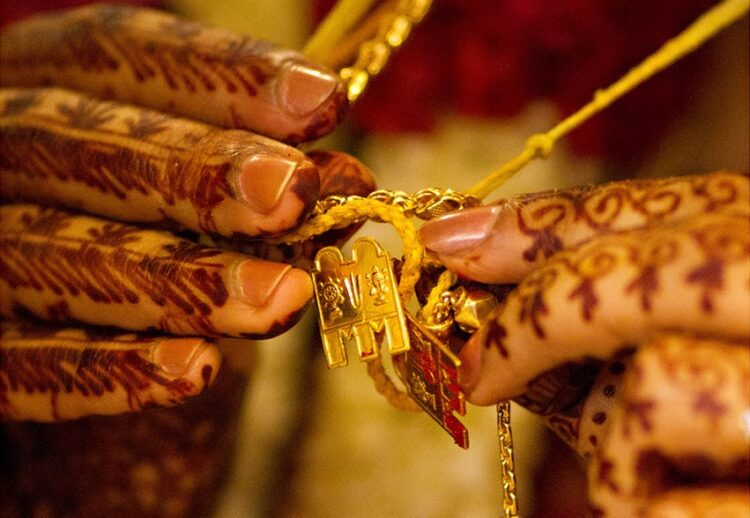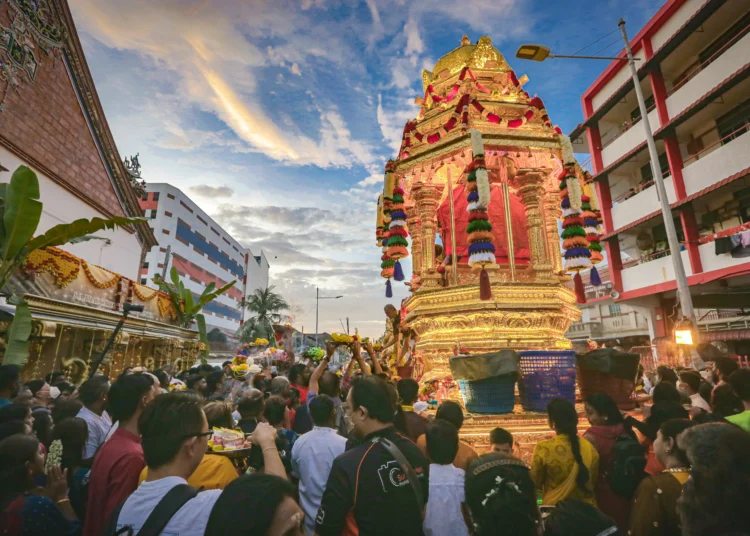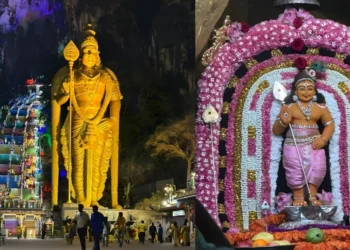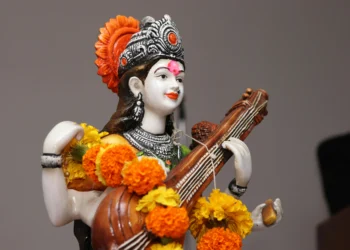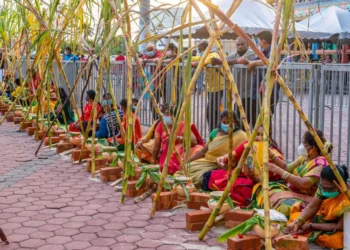The climax of an average Malaysian Hindu wedding is the thaali tying ceremony. The guests wait excitedly for the nadaswaram to hit that high note, so they can fling the yellow rice (or flower petals) towards the couple, before rushing to the buffet counter. Lately, however, many couples are waving goodbye not to the ceremony, but to the sacred thaali.
The thaali is a golden chain that the groom ties around the bride’s neck in a Hindu wedding ceremony. The pendant of the thaali differs according to affordability, region, and of course, caste. Numerous rituals lead up to tying the thaali, including the ponnuruku, resulting in the idealisation of this chain as the ultimate Hindu wedding symbol. Let’s not even talk about how expensive a thaali is these days, most are north of RM10,000!
Why do some take issue with the thaali?
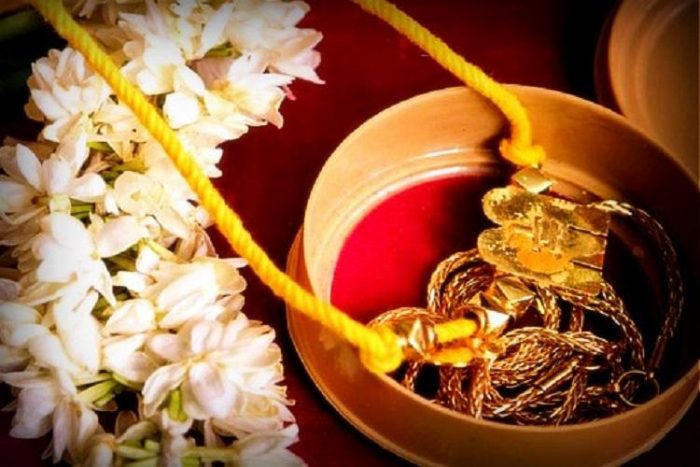
The thaali tying seals the deal. The moment the groom hooks the clasp of the gold chain around the bride’s neck, the couple is said to be married. What’s more interesting is that the life and safety of the groom is now stored in the gold pendant of the thaali.
the life and safety of the groom is now stored in the gold pendant of the thaali.
To many, the thaali symbolises the man now ‘owning’ his wife. Of course, this can be extended to any form of marital adornment, such as wedding rings. The problem with the thaali is this – there is no reciprocation on the male end. Nothing really changes for the groom in terms of marital insignia. Even his marital toe rings are removed soon after.
It’s a different story for the bride. She is now expected to wear the thaali for a certain number of days before it can be removed, she cannot be seen with vibuthi only, and she gets bonus points if the vermilion sits at her hairline, bang smack in the middle of her forehead. Some cultures require the bride to wear a set of red bangles for a minimum of 40 days, or more.
the new wife is now expected to wear the thaali for a certain number of days before it can be removed, she cannot be seen with vibuthi only, she must wear flowers in her hair, and she gets bonus points if the vermilion sits at her hairline, bang smack in the middle of her forehead.
Perhaps it is more cultural than religious, that married women are expected to be demarcated, while men are not expected to change their appearance whatsoever.
The misogyny of Hindu wedding rituals
Truth be told, the thaali isn’t even the most misogynistic event to take place during the Hindu wedding ritual. There is the controversial act of Kanyadaan. And then there is the part of the ceremony where the bride falls at the groom’s feet, to be blessed. Needless to say, the reverse does not take place.
As a result of all this one-sidedness, many couples have decided to skip the patriarchal traditions altogether. Some opt for a practical registration of marriage at National Registration Department, followed by a reception to appease the elders. Others have had the rituals of a Hindu wedding, just minus the thaali.
A Hindu wedding without a thaali, you say? How is that even possible?
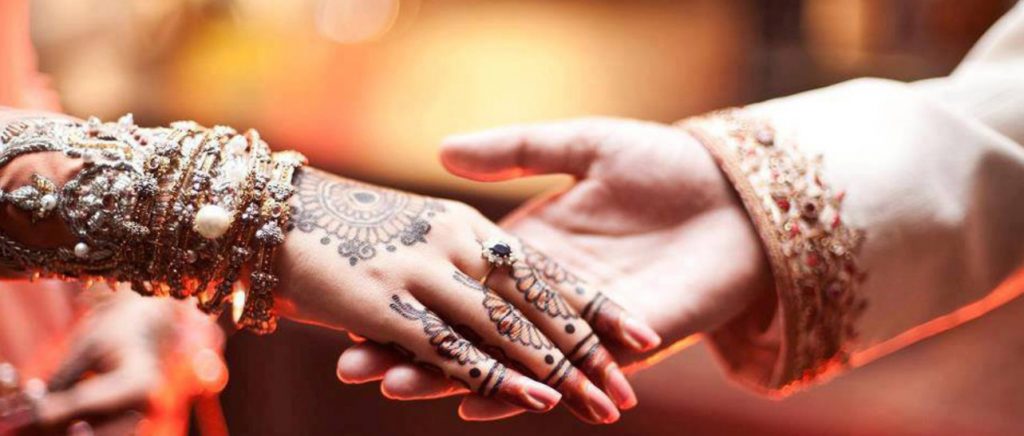
Malaysian women have begun waving goodbye to this misogynistic tradition. Sugeetha*, a medical doctor says, “My husband and I both found it ludicrous that the Hindu wedding ritual was so gender biased. Thankfully, the parents on both sides were very supportive of the fact that we wanted to do something else,”
Sugeetha and her husband tied the knot almost a decade ago, and she tells us what made it special was the fact that the two of them planned their own ceremony, “We had an intimate ceremony that involved the exchange of rings, garlands and touching speeches by our loved ones,”
For Aleesha* and her husband, their motivations were different. “My husband and I have very strong feelings of disdain for casteism,” As a result, they decided not to adhere to the norm of having a Brahmin priest officiate their nuptials. Aleesha’s uncle learnt all the mantras and rituals that a Hindu wedding involved, and the couple sat down with him and omitted the patriarchal practices from the ceremony. “My husband didn’t present me with a thaali, my father didn’t wash his feet and I didn’t fall at my husband’s feet. We couldn’t be happier with how it turned out!”
“My husband didn’t present me with a thaali, my father didn’t wash his feet and I didn’t fall at my husband’s feet. we couldn’t be happier with how it turned out!”
Over in India, reality show contestant Vaishnavi Prasad married her partner, Anjan Kumar in a simple temple ceremony which involved a short pooja before the couple exchanged garlands. There was no exchange of rings nor a thaali. Vaishnavi tweeted that she and her husband have saved themselves lots of stress and money by having a simple wedding ceremony. They plan to use the funds saved to care for animals.
In Tamil Nadu, India, there is a provision for marriages that take place without a priest nor a thaali. They are called self-respect marriages, thanks to a movement led by S Ramanathan and Periyar to achieve a society where backward castes have equal human rights.
“But it’s just a ritual, who cares?”
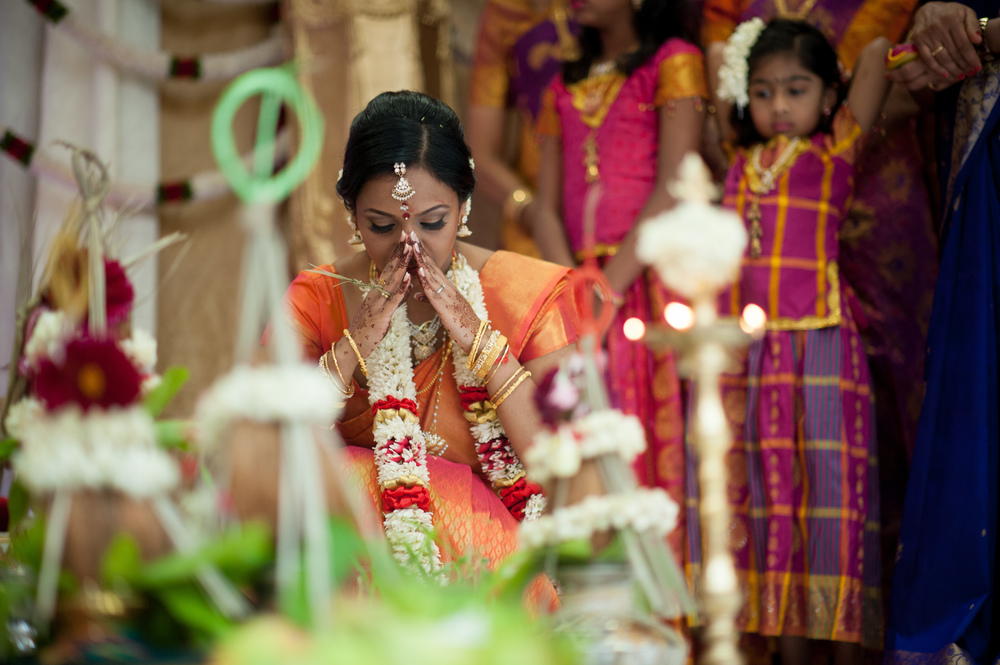
Others couldn’t care less, it is merely a ritual that would make their elders happy, what could be the harm in that, they ask.
Tax consultant Vani* tells us that when she gets married, she wouldn’t have a problem with the thaali tying ritual. “It is just a part of the ritual, just because my husband has presented me with a thaali, it doesn’t mean that I need to be subservient to him or his family,” She says that what matters is the relationship between the couple is strong enough, and there is an understanding that a mere hour long ritual cannot shake.
Ladies, you are in the driver’s seat!
Ultimately, there is no accounting for taste. It’s impossible to explain why different people can accept and enjoy different things, thaali tying included. The uniqueness of Hinduism lies in the fact that it is a way of life, as opposed to an organized religion. Believers are able to embrace it in their own way.
Because of that, it is so important that a woman can voice out her opinions, and make an informed choice about how she wants to get married, and which rituals she does not want to partake in. After all, marriages are made in heaven – where it is dripping with gold, right?
*Names have been changed to protect privacy
Follow us on Instagram, Facebook or Telegram for more updates and breaking news.


